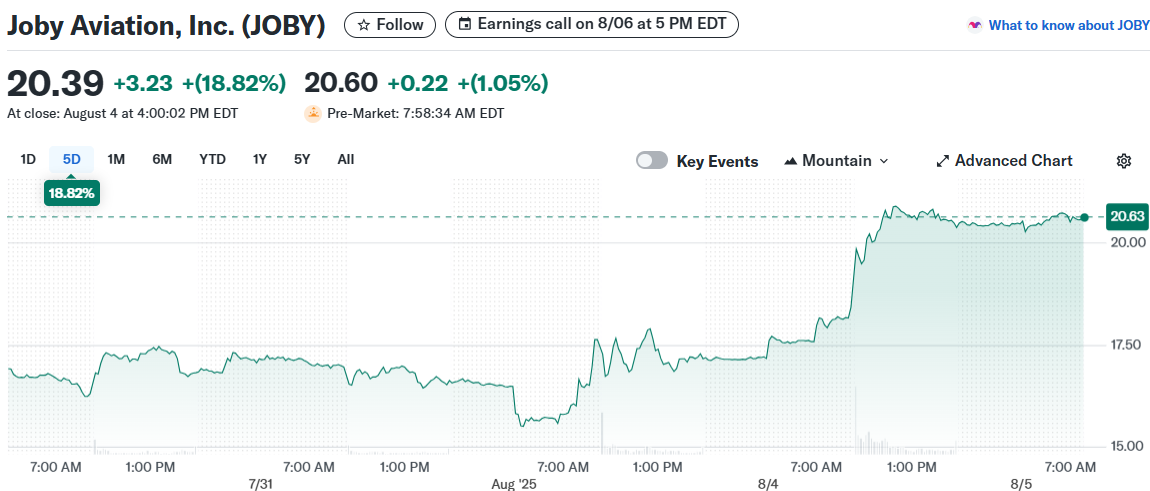TLDR
- Joby Aviation acquired Blade Air Mobility’s passenger helicopter rideshare business for $125 million, gaining 50,000+ customers and key NYC infrastructure
- Blade stock surged 30% early Monday while Joby rose over 18% following the deal announcement
- Joby also partnered with L3Harris Technologies to develop military aircraft, opening defense market opportunities
- The acquisitions provide Joby with immediate commercial operations and diversify revenue streams beyond passenger transport
- Blade’s medical transport business will spin off into a separate public company called Strata Critical Medical
Joby Aviation completed a strategic double play in 48 hours that sent its stock soaring to record levels. The electric aircraft developer announced two separate deals that fundamentally changed its business trajectory.

On August 4, Joby revealed it would acquire Blade Air Mobility’s passenger helicopter rideshare business for $125 million. The announcement sent Blade stock up as much as 30% in early trading while Joby shares climbed over 18%.
Just one day earlier, Joby had announced a partnership with defense contractor L3Harris Technologies. The collaboration will focus on developing military aircraft based on Joby’s existing technology platform.
🇺🇸 L3Harris (@L3HarrisTech) and Joby Aviation (@jobyaviation) announced collaboration for new aircraft class for defense applications.
"The collaboration leverages Joby’s existing commercial aircraft development program and leading manufacturing capabilities, combined with… pic.twitter.com/nIwjaxmy8b
— Counter Unmanned Systems (@CUAS_NEWS) August 4, 2025
The market responded decisively to both announcements. Joby’s stock price pushed past $20, reaching all-time highs and bringing the company’s market capitalization above $14 billion.
Infrastructure and Customer Base Acquisition
The Blade acquisition solves multiple challenges for Joby in one transaction. Blade operates helicopter services from 12 terminals around New York City, transporting passengers to destinations like the Hamptons and Newark Airport.
The deal gives Joby immediate access to established infrastructure. This includes dedicated terminals and passenger lounges in key urban markets, particularly around New York City.
Joby will inherit Blade’s customer base of over 50,000 passengers who flew in 2024. These customers are already familiar with urban air mobility services and represent a premium demographic.
Blade founder and CEO Rob Wiesenthal will remain in charge of passenger operations. The helicopter business will become a wholly owned subsidiary of Joby under the new structure.
Blade’s medical transport operations were excluded from the deal. These services will spin off into a separate public company called Strata Critical Medical.
The acquisition price could reach $125 million based on performance metrics. Joby plans to transition Blade’s customers to its electric aircraft once regulatory approval is obtained.
Blade went public through a SPAC transaction in 2021 but has not reported annual profits since. The company’s shares were down 11% year-to-date before the acquisition announcement.
Defense Market Entry Through L3Harris Partnership
The L3Harris partnership opens an entirely separate revenue stream for Joby. The companies will develop autonomous, gas turbine hybrid aircraft specifically for military applications.
Flight testing of the new military aircraft is expected to begin in fall 2025. The project builds on Joby’s core S4 platform and incorporates autonomous flight technology from its 2024 Xwing acquisition.
L3Harris brings defense industry credentials as a “Trusted Disruptor” in government contracting. This partnership provides validation of Joby’s technology and manufacturing capabilities.
The defense collaboration offers potential for large, government-funded contracts. This represents non-dilutive funding that doesn’t require issuing new shares to existing investors.
The military market diversifies Joby’s revenue opportunities beyond commercial passenger transport. Government contracts typically offer more predictable funding compared to consumer markets.
Joby’s stock has surged past analyst price targets, which average below $10 per share. The market appears to be pricing in the transformative nature of both deals faster than Wall Street models can adjust.
The company’s second-quarter earnings call on August 6 will likely focus on integration plans rather than future strategy questions. Both deals provide concrete execution timelines for investors to track.
Joby is working toward Federal Aviation Administration certification for its electric vertical takeoff and landing aircraft. The company plans to have five aircraft in final certification phases by 2026 with commercial flights starting early next year.






